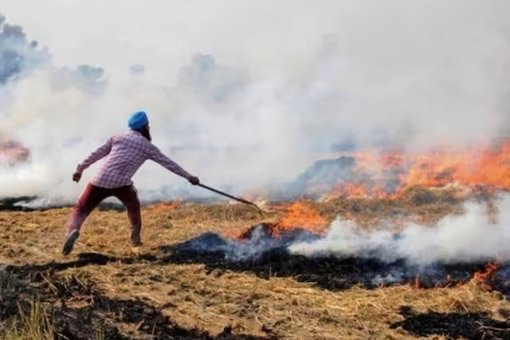New Delhi, Oct 19: The Centre on Wednesday said the incidents of stubble burning have started increasing rapidly, especially in Punjab, and the state government has not taken adequate steps to prevent farm fires.
At an inter-ministerial meeting on the issue of crop residue burning in Delhi-NCR, Union Environment Minister Bhupender Yadav expressed concerns that the Punjab government has not been able to take coordinated actions to contain farm fires in the state.
“The state had been provided with a sufficient number of equipment and farm machinery and adequate funds, yet there has not been sufficient progress in implementation of the action plan,” a statement quoted the minister as saying.
Union Agriculture and Farmers Welfare Minister Narendra Singh Tomar mentioned that the status of paddy straw management in Haryana is “significantly better than that in Punjab”.
“Till October 15, the trend of fire events was less as compared to last year but now it has started growing rapidly, especially in Punjab,” the statement read.
The ministers noted that the Pusa bio-decomposer – a microbial solution which turns stubble into manure in 15-20 days – was being sprayed on smaller areas in Punjab and its application needs to be promoted and enhanced.
M M Kutty, chairperson of the Commission for Air Quality Management (CAQM), said Punjab has taken “inadequate” steps in spite of several meetings and efforts by the statutory panel.
The Punjab chief secretary was asked to control the increasing rate of fire events in Amritsar and to ensure a 50 per cent reduction in cases of farm fires in the state in comparison to last year.
It was mentioned in the meeting that one of the main concerns is the delayed delivery of crop residue management machines in Punjab and Haryana.
The ministers said there must be a coordinated ecosystem for collection, aggregation, storage and transportation of the paddy straw for effective ex-situ management.
Union Minister of Fisheries and Animal Husbandry & Dairying Parshottam Rupala said that there is a shortage of fodder in various parts of the country and suggested that an efficient system be developed for transportation of the stubble available in the NCR region to the fodder deficient regions.
Along with unfavourable meteorological conditions, paddy straw burning in adjoining states is a major reason behind the alarming spike in air pollution levels in the national capital in October and November. Farmers set their fields on fire to quickly clear off the crop residue before cultivating wheat and vegetables.
Government data showed Punjab and Haryana generate around 27 million tonnes of paddy straw a year, of which around 6.4 million tonnes is not managed.
According to the Indian Agricultural Research Institute, Punjab reported 71,304 farm fires between September 15 and November 30 last year and 83,002 farm fires in the corresponding period in 2020.
Last year, the share of farm fires in Delhi’s PM 2.5 pollution peaked to 48 per cent on November 7. (PTI)












